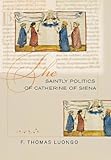The Saintly Politics of Catherine of Siena / F. Thomas Luongo.
Material type: TextPublisher: Ithaca, NY : Cornell University Press, [2018]Copyright date: ©2006Description: 1 online resource (244 p.) : 2 maps, 2 halftonesContent type:
TextPublisher: Ithaca, NY : Cornell University Press, [2018]Copyright date: ©2006Description: 1 online resource (244 p.) : 2 maps, 2 halftonesContent type: - 9781501728297
- 282/.092 22
- online - DeGruyter
| Item type | Current library | Call number | URL | Status | Notes | Barcode | |
|---|---|---|---|---|---|---|---|
 eBook
eBook
|
Biblioteca "Angelicum" Pont. Univ. S.Tommaso d'Aquino Nuvola online | online - DeGruyter (Browse shelf(Opens below)) | Online access | Not for loan (Accesso limitato) | Accesso per gli utenti autorizzati / Access for authorized users | (dgr)9781501728297 |
Frontmatter -- Contents -- Maps and Illustrations -- Acknowledgments -- Brief Chronology -- Introduction -- 1. Catherine's Vocational Years: Worldliness and Female Sanctity -- 2. Catherine Enters Tuscan Politics: Networks and Letter Writing -- 3. Niccolo di Toldo and the Erotics of Political Engagement -- 4. Catherine's Sienese famiglia: Pious Networks and Political Identities -- 5. Prophetic Politics: Catherine in the War of Eight Saints -- Conclusion -- Bibliography -- Index
restricted access online access with authorization star
http://purl.org/coar/access_right/c_16ec
Saint Catherine of Siena (1347–1380) has become a defining figure in the history of medieval religion and one of the main exemplars of the "feminine turn" in late medieval religious culture. Despite a hagiographical tradition and historiography that has placed Catherine at a mystic remove from the politics of her day, Catherine's public authority was shaped by politics, both locally in Siena and broadly within late-fourteenth-century contests between the papacy and the Republic of Florence for hegemony in central Italy. In The Saintly Politics of Catherine of Siena, F. Thomas Luongo combines literary-critical readings of Catherine's letters—she was the author of one of the largest collections of medieval letters—with political and social analysis. Drawing on a wide range of archival sources, Luongo investigates how Catherine's spiritual authority and sanctity were linked with contemporary political and cultural developments. He shows how the political situation of the church in Italy and a culture that privileged female spirituality and prophetic speech facilitated Catherine's emergence into a public role.The Catherine who emerges from Luongo's well-written pages is a splendid example of what can result when a historian asks fresh questions about a familiar figure's life and brings new materials and methods to bear in formulating answers. The Saintly Politics of Catherine of Siena offers a woman more complex and interesting than the figure portrayed in most contemporary scholarship.
Mode of access: Internet via World Wide Web.
In English.
Description based on online resource; title from PDF title page (publisher's Web site, viewed 26. Apr 2024)


